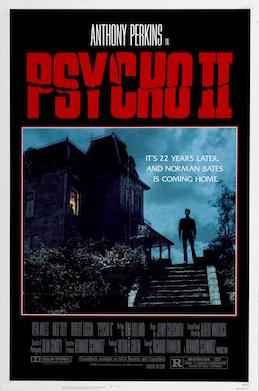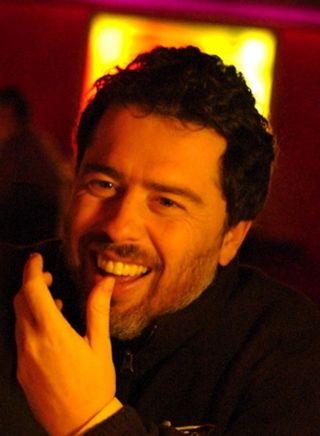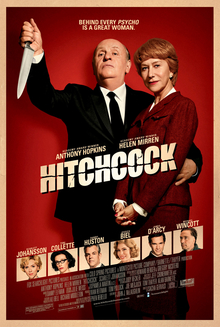
Sir Alfred Joseph Hitchcock was an English film director. He is widely regarded as one of the most influential figures in the history of cinema. In a career spanning six decades, he directed over 50 feature films, many of which are still widely watched and studied today. Known as the "Master of Suspense", Hitchcock became as well known as any of his actors thanks to his many interviews, his cameo appearances in most of his films, and his hosting and producing the television anthology Alfred Hitchcock Presents (1955–65). His films garnered 46 Academy Award nominations, including six wins, although he never won the award for Best Director, despite five nominations.

Psycho is a 1960 American horror film produced and directed by Alfred Hitchcock. The screenplay, written by Joseph Stefano, was based on the 1959 novel of the same name by Robert Bloch. The film stars Anthony Perkins, Janet Leigh, Vera Miles, John Gavin, and Martin Balsam. The plot centers on an encounter between on-the-run embezzler Marion Crane (Leigh) and shy motel proprietor Norman Bates (Perkins) and its aftermath, in which a private investigator (Balsam), Marion's lover Sam Loomis (Gavin), and her sister Lila (Miles) investigate her disappearance.

Alma Lucy Reville, Lady Hitchcock was an English screenwriter and film editor. She was the wife of film director Alfred Hitchcock. She collaborated on scripts for her husband's films, including Shadow of a Doubt, Suspicion, and The Lady Vanishes, as well as scripts for other directors, including Henrik Galeen, Maurice Elvey, and Berthold Viertel.

Frenzy is a 1972 British thriller film directed by Alfred Hitchcock. It is the penultimate feature film of his extensive career. The screenplay by Anthony Shaffer was based on the 1966 novel Goodbye Piccadilly, Farewell Leicester Square by Arthur La Bern. The film stars Jon Finch, Alec McCowen and Barry Foster and features Billie Whitelaw, Anna Massey, Barbara Leigh-Hunt, Bernard Cribbins and Vivien Merchant. The original music score was composed by Ron Goodwin.

Vera June Miles is an American retired actress. She is known for appearing in John Ford's Western films The Searchers (1956) and The Man Who Shot Liberty Valance (1962), and for playing Lila Crane in Alfred Hitchcock's Psycho (1960) and Richard Franklin's sequel Psycho II (1983).

Joseph William Stefano was an American screenwriter, known for adapting Robert Bloch's novel as the script for Alfred Hitchcock's film Psycho, and for being the producer and co-writer of the original The Outer Limits television series.

Psycho II is a 1983 American psychological slasher film directed by Richard Franklin, written by Tom Holland, and starring Anthony Perkins, Vera Miles, Robert Loggia, and Meg Tilly. It is the first sequel to Alfred Hitchcock's 1960 film Psycho and the second film in the Psycho franchise. Set 22 years after the first film, it follows Norman Bates after he is released from the mental institution and returns to the house and Bates Motel to continue a normal life. However, his troubled past continues to haunt him as someone begins to murder the people around him. The film is unrelated to the 1982 novel Psycho II by Robert Bloch, which he wrote as a sequel to his original 1959 novel Psycho.

Alexander Simon "Sacha" Gervasi is a British director, screenwriter and former journalist.
Psychological thriller is a genre combining the thriller and psychological fiction genres. It is commonly used to describe literature or films that deal with psychological narratives in a thriller or thrilling setting.

Psycho is an American horror franchise consisting of six films loosely based on the Psycho novels by Robert Bloch: Psycho, Psycho II, Psycho III, Bates Motel, Psycho IV: The Beginning, the 1998 remake of the original film, and additional merchandise spanning various media. The first film, Psycho, was directed by filmmaker Alfred Hitchcock. Subsequently, another film related to the series was made: an Alfred Hitchcock biopic, and two new novels, by Takekuni Kitayama and Chet Williamson, were released. Also, an independent documentary called The Psycho Legacy was released on October 19, 2010, mostly focusing on Psycho II, Psycho III and Psycho IV: The Beginning, while covering the impact and legacy of the original film.

Greenwillow is a musical with a book by Lesser Samuels and Frank Loesser and music and lyrics by Loesser. The musical is set in the magical town of Greenwillow. It ran on Broadway in 1960.
Stephen Rebello is an American writer, screenwriter, journalist and former clinical therapist.
Marli Renfro is an American former showgirl, model, Playboy cover girl and actress.

Hitchcock is a 2012 American biographical romantic drama film directed by Sacha Gervasi and based on Stephen Rebello's 1990 non-fiction book Alfred Hitchcock and the Making of Psycho. Hitchcock tells the story of the relationship between Alfred Hitchcock and his wife, Alma Reville, during the filming of Psycho in 1959. Hitchcock premiered at the AFI Fest on November 1, 2012, and was released in the United States on November 23 by Fox Searchlight Pictures. It grossed $27 million against a $15 million budget.

The Girl is a 2012 British television film directed by Julian Jarrold, written by Gwyneth Hughes and produced by the BBC and HBO Films. The film stars Sienna Miller as Tippi Hedren and Toby Jones as Alfred Hitchcock. It is based on Donald Spoto's 2009 book Spellbound by Beauty: Alfred Hitchcock and His Leading Ladies, which discusses the English film director Hitchcock and the women who played leading roles in his films. The Girl's title was inspired by Hitchcock's alleged nickname for Hedren.
A list of books and essays about Alfred Hitchcock:

Hitchcock/Truffaut is a 1966 book by François Truffaut about Alfred Hitchcock, originally released in French as Le Cinéma selon Alfred Hitchcock.
Margaret Robertson was a British script supervisor and personal assistant to Alfred Hitchcock from the 1940s to the 1970s during which time she worked on his films Under Capricorn (1948) and Stage Fright (1950), before joining his team permanently on Vertigo (1958), working thereafter on all of the director's remaining films.

Hitchcock (Original Motion Picture Soundtrack) is the soundtrack accompanying the 2012 film Hitchcock directed by Sacha Gervasi. The film's original score is composed by Danny Elfman and released through Sony Masterworks on December 4, 2012. The score featured inspirations from the works of Bernard Herrmann, whom Elfman had been inspired by.














